-
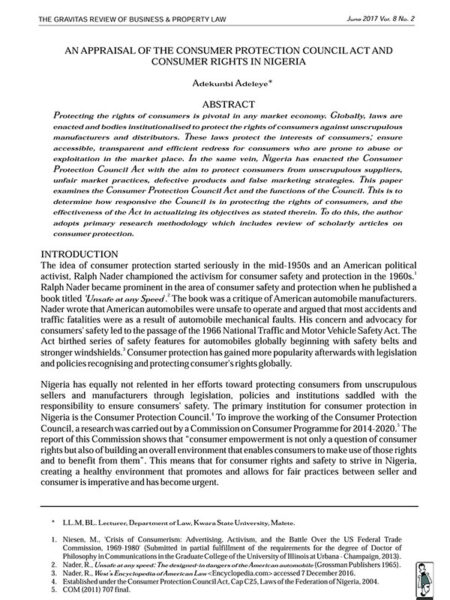
An Appraisal of the Consumer Protection Council Act and Consumer Rights in Nigeria
0₦2,500.00Adekunbi Adeleye Lecturer, Kwara State University, Malete in his article “An Appraisal of the Consumer Protection Council Act and Consumer Rights in Nigeria”, examines the legal framework for protection of consumer rights in Nigeria with emphasis on the Consumer Protection Council Act. He appraises the state of consumer rights in Nigeria and how effective the law has been in protecting consumers against unscrupulous suppliers, unfair market practices, defective products and false marketing strategies.
-
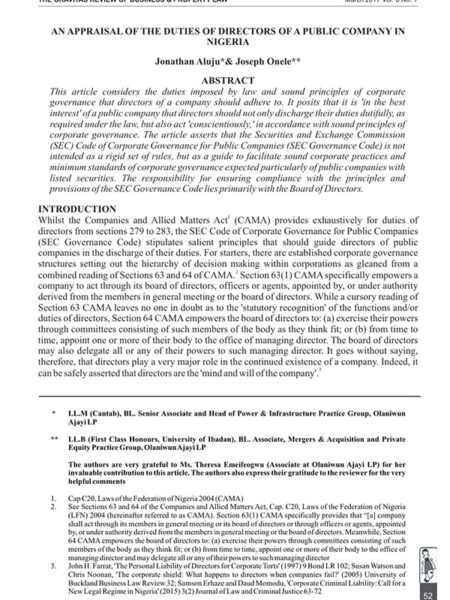
An Appraisal of the Duties of Directors of a Public Company in Nigeria
0₦2,500.00Jonathan Aluju and Joseph Onele, Associates at Olaniwun Ajayi LP in their article “An Appraisal of the Duties of Directors of a Public Company in Nigeria” consider the duties imposed by law and principles of corporate governance that directors of a company should adhere to. They examine the duty of directors, what is ‘in the best interest’ of a public company, corporate benefit and opportunities, and multiple and interlocking directorships within the context of case law, CAMA and SEC Code of Corporate Governance for Public Companies.
-
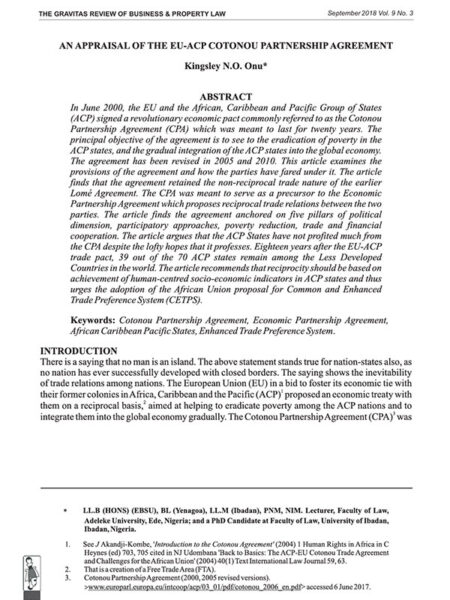
An Appraisal of the EU-ACP Cotonou Partnership Agreement
0₦2,500.00Kingsley Onu, Lecturer, Faculty of Law, Adeleke University, Ede in his article An Appraisal of the EU-ACP Cotonou Partnership Agreement, examines the provisions of the CPA signed in June 2000 in Cotonou between the European Union and the African, Caribbean and Pacific Group of States (ACP) and the Revisions of 2005 and 2010. He notes that the principal objective of the agreement is the eradication of poverty in the ACP states and their integration into the global economy. He argues that the goals have not been met as 39 out of the 70 ACP states remain among the Less Developed Countries (LDCs) in the world. He advocates for cooperation and reciprocity between EU and ACP based on human-centred socio-economic indicators, and recommends the adoption of the African Union proposal for Common and Enhanced Trade Preference System (CETPS).
-
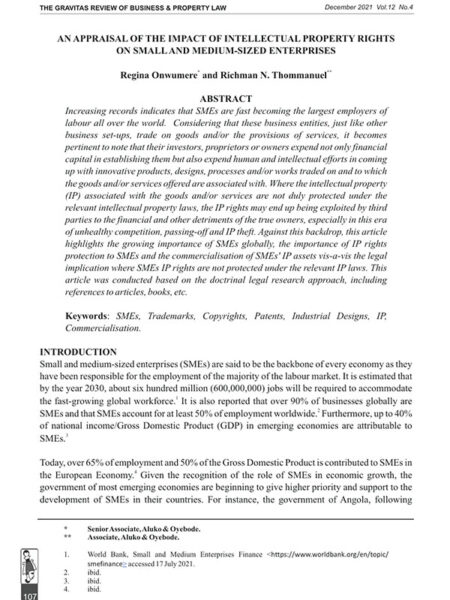
An Appraisal of the Impact of Intellectual Property Rights on Small and Medium-Sized Enterprises
0₦2,500.00Regina Onwumere and Richman Thommanuel, both of Aluko & Oyebode, in their article, An Appraisal of the Impact of Intellectual Property Rights on Small and Medium-Sized Enterprises, indicate that small and medium-sized enterprises (SMEs) are fast becoming the largest employers of labour all over the world. Where the intellectual property (IP) associated with the goods or services produced by SMEs are not duly protected under the relevant intellectual property laws, the IP rights may end up being exploited by third parties to the detriment of the true owners. Against this backdrop, the authors highlight the growing importance of SMEs globally, the importance of IP rights protection to SMEs and the commercialisation of SMEs’ IP assets vis-a-vis the legal implication where SMEs IP rights are not protected under the relevant IP laws.
-
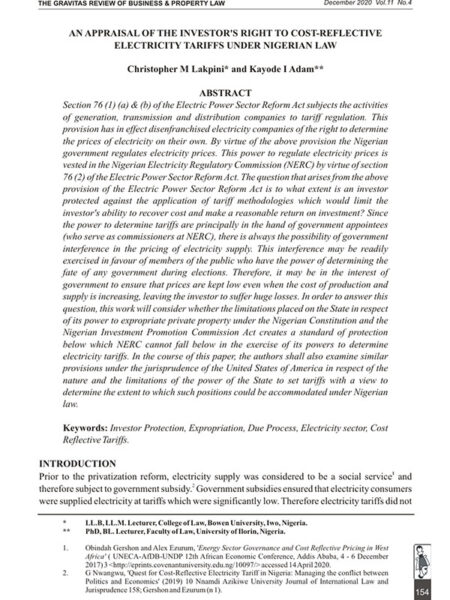
An Appraisal of the Investor’s Right to Cost-Reflective Electricity Tariffs Under Nigerian Law
0₦2,500.00Christopher Lakpini of the College of Law Bowen University Iwo Nigeria and Dr Kayode Adam of the Faculty of Law University of Ilorin Nigeria in their article, An Appraisal of the Investor’s Right to Cost-Reflective Electricity Tariffs Under Nigerian Law, observe that section 76 (1) (a) & (b) of the Electric Power Sector Reform Act (the Act) subjects the activities of generation, transmission and distribution companies to tariff regulation. This provision has robbed electricity companies of the right to determine the price of electricity automatically. Lakpini and Adam examine if power sector investors have a right to recover their cost and make a reasonable return on investment. They consider whether the limitation imposed by the Act amounts to expropriation under Nigerian law, and the treatment of similar provisions under the United States jurisprudence.
-
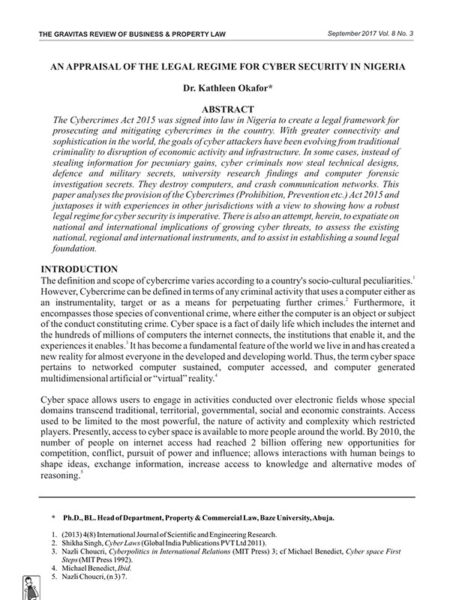
An Appraisal of the Legal Regime for Cyber Security in Nigeria
0₦2,500.00With greater connectivity and sophistication, the goals of cyber attackers have been evolving from traditional criminality to disruption of economic activity and infrastructure. In some cases, instead of stealing information for pecuniary gains, cyber criminals now steal technical designs, defence and military secrets, university research findings, and investigation secrets. Dr. Kathleen Okafor, Head of Department, Property & Commercial Law, Baze University, Abuja in her article, “An Appraisal of The Legal Regime for Cyber Security in Nigeria”, comprehensively reviews the existing national legal regime for cyber security, and assesses how regional and international instruments seek to make the world a safer place.
-
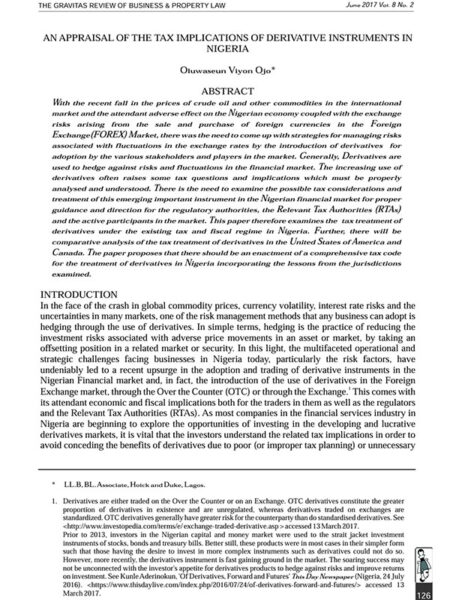
An Appraisal of the Tax Implications of Derivative Instruments in Nigeria
0₦2,500.00Oluwaseun Ojo, Associate, Hoick and Duke in his article, “An Appraisal of The Tax Implications of Derivative Instruments in Nigeria”, examines how instruments like futures, swap, options and forward contracts are used to hedge against risks and fluctuations in the financial market. He traces the use of Derivatives in Nigerian financial market and its tax treatment under the Companies Income Tax Act, the Capital Gains Tax Act and the Value Added Tax Act.
-
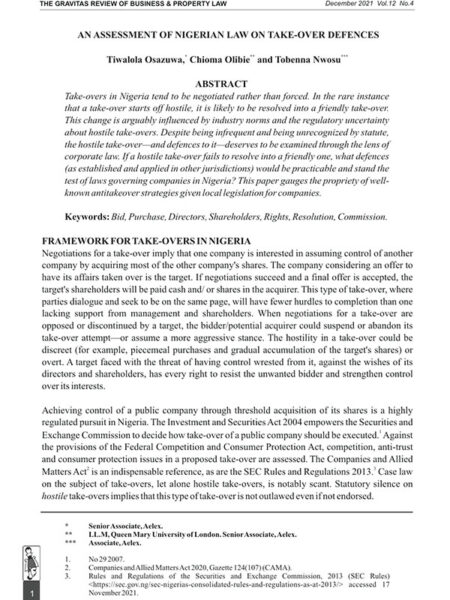
An Assessment of Nigerian Law on Take-Over Defences
0₦2,500.00Tiwalola Osazuwa, Chioma Olibie, and Tobenna Nwosu, all of Aelex in their article, An Assessment of Nigerian Law on Take-Over Defences, note that take-overs in Nigeria tend to be negotiated rather than forced. In the rare instance that a take-over starts off hostile, it is likely to be resolved into a friendly take-over. Though hostile take-over is unrecognised by statute in Nigeria, Osazuwa et al examine the framework for take-overs through the lens of corporate law. They consider take-over devices and defences and well-known anti-takeover strategies.
-
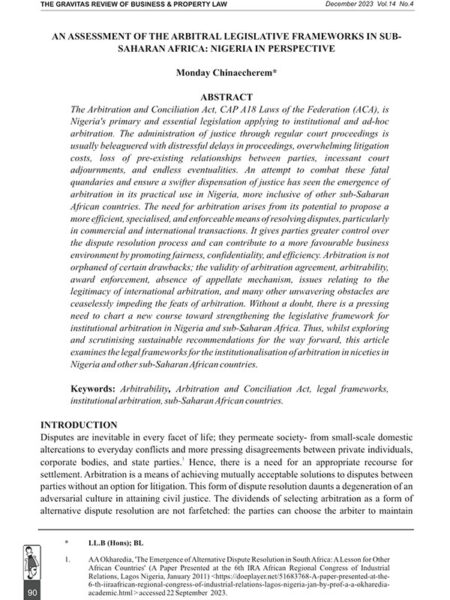
An Assessment of the Arbitral Legislative Frameworks in Sub-Saharan Africa: Nigeria in Perspective
0₦2,500.00Monday Chinaecherem, in his article, An Assessment of the Arbitral Legislative Frameworks in Sub-Saharan Africa: Nigeria in Perspective, undertakes an assessment of the legal framework for arbitral proceedings in sub-saharan Africa. He chronicles arbitral institutions in the region and extant legal reforms designed to increase the availability and choice of African destinations for commercial arbitration. He underscores a pressing need to chart a new course toward strengthening the legislative framework for institutional arbitration in Nigeria and sub-Saharan Africa. Chinaecherem whilst exploring and scrutinizing sustainable recommendations for the way forward examines in niceties, the legal frameworks for the institutionalization of arbitration in Nigeria and other sub-Saharan African countries.
-
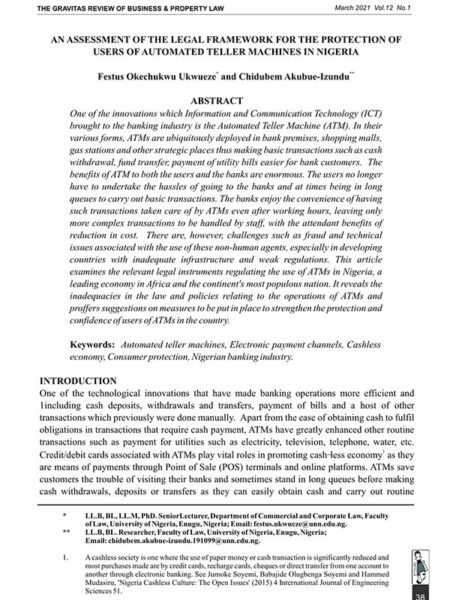
An Assessment of the Legal Framework for the Protection of Users of Automated Teller Machines in Nigeria
0₦2,500.00Dr Festus Ukwueze and Chidubem Akubue-Izundu of the Faculty of Law University of Nigeria Enugu Nigeria in their article, An Assessment of the Legal Framework for the Protection of Users of Automated Teller Machines in Nigeria, note the convenience and benefits of ATMs: faster cash withdrawals, easy fund transfer, convenient payment of utility bills. There are, however, challenges, mainly fraud and technical issues associated with the use of these non-human agents. Dr Ukwueze and Akubue-Izundu comprehensively review the relevant legal instruments regulating the use of ATMs in Nigeria. They posit that the laws and policies relating to ATMs’ operations are inadequate and proffer suggestions on measures to be put in place to strengthen the protection and confidence of users of ATMs in the country.
-
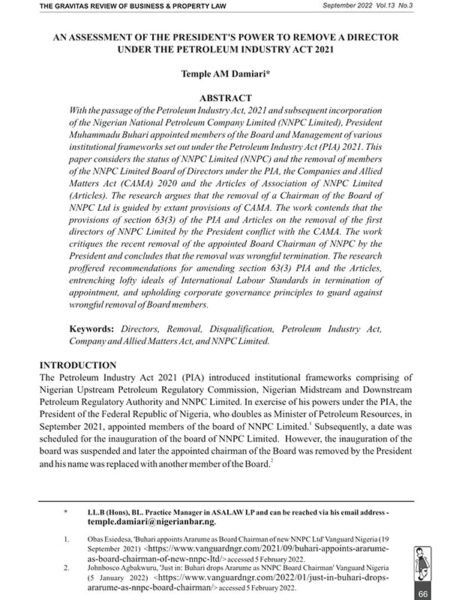
An Assessment of the President’s Power to Remove a Director under the Petroleum Industry Act 2021
0₦2,500.00Temple Damiari of ASALAW LP, in his paper, An Assessment of the President’s Power to Remove a Director under the Petroleum Industry Act 2021, notes that with the passage of the Petroleum Industry Act 2021 and subsequent incorporation of the Nigerian National Petroleum Company Limited (NNPC Limited), President Muhammadu Buhari appointed members of the Board and Management of various institutional frameworks set out under the Petroleum Industry Act (PIA) 2021. Damiari considers the status of NNPC Limited and the removal of members of NNPC Limited Board of Directors under the PIA, the Companies and Allied Matters Act (CAMA) 2020 and Articles of Association of NNPC Limited (Articles). He argues that extant provisions of CAMA guide the removal of a Chairman of the Board of NNPC Ltd. He contends that the provisions of section 63(3) of the PIA and Articles on the removal of the first directors of NNPC Limited by the President conflict with the CAMA. He critiques the recent removal of the appointed Board Chairman of NNPC by the President and concludes that the removal was wrongful termination.
-
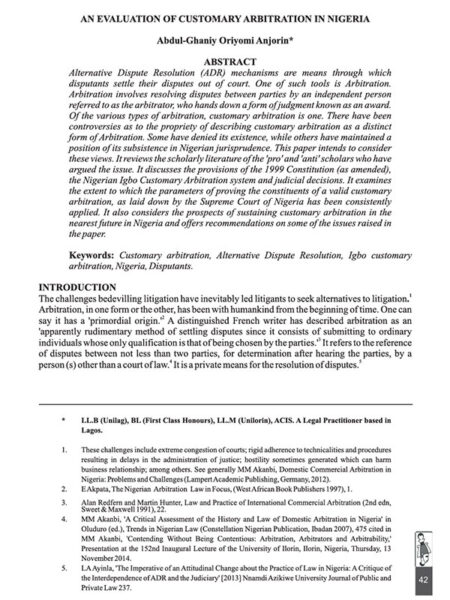
An Evaluation of Customary Arbitration in Nigeria
0₦2,500.00Abdul-Ghaniy Anjorin, in his article, An Evaluation of Customary Arbitration in Nigeria, undertakes a comprehensive overview of Customary Arbitration in Nigeria. He examines the parameters laid down by the Supreme Court in proving a compelling customary arbitration, and how these had been applied in various cases. He concludes with his view on the prospects of sustaining customary arbitration in the nearest future.
The Gravitas Review of Business & Property Law



